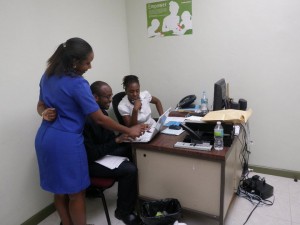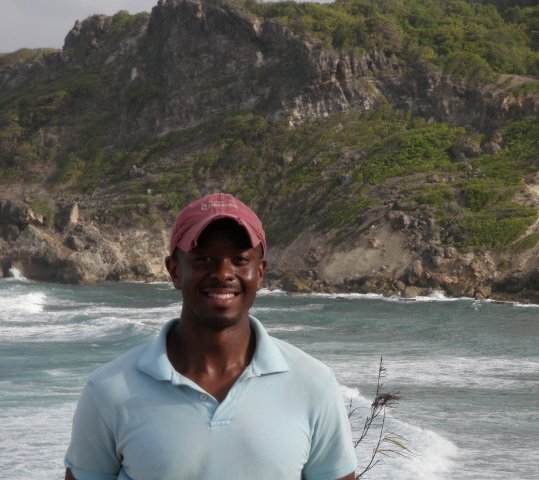I came to Barbados on a Fulbright grant to conduct a study examining the risk and health-seeking behaviors of incarcerated men in Her Majesty’s Prison Dodds, St. Philip. During my first trip to the prison, I was simultaneously excited and apprehensive. I was apprehensive not so much because I was visiting a prison, but because I would be asking the men serving sentences there to trust me with their life stories and experiences. I was anxious to see how they would react to my research questions which had taken months to prepare. By the time I had been granted approval to conduct my research in the prison, I had developed a burgeoning appreciation for the impact my work could have. After my first meeting with the HIV coordinator and prison psychologist, the two people who guided my direct involvement with the men in Her Majesty’s Prison Dodds, I was reminded of the importance of relationships – a lesson at the heart of my Fulbright experience.
Because of the HIV coordinator’s and psychologist’s support, the imprisoned men were curious and receptive to my work. Everyone was curious to know who was the visiting American interested in learning about their lives. While working in the prison, the HIV coordinator allowed me, along with some female graduate students, to lead discussions. This helped me to build a rapport with several of the men whom I would later interview for my study.
During the meetings before entering the prison, I spoke with experts from the Barbados Ministry of Health (MOH) and HIV/AIDS Commission, as well as the University of West Indies, Cave Hill. From these conversations, I was able to connect the names I had researched in books and the Nation newspaper’s electronic archive with the people who were quickly becoming my friends, mentors and colleagues; from these relationships, I was able to build a network of colleagues who supported me professionally and socially.
 Nicole and Mikala, two consultants at the MOH, gave me an in-depth, crash course on qualitative research and provided articles on the how, why and when to use different research methods. They also took me on tours of the island, invited me to dinner with their families and rescued me when a water main burst near my apartment leaving me without running water. Several other colleagues opened up their homes and went out of their way to help me, so much so, that when I had discouraging meetings (i.e., my ideas got scraped and I had to go back to the drawing board), I was reassured by the knowledge that my friends would motivate me to push through my setbacks.
Nicole and Mikala, two consultants at the MOH, gave me an in-depth, crash course on qualitative research and provided articles on the how, why and when to use different research methods. They also took me on tours of the island, invited me to dinner with their families and rescued me when a water main burst near my apartment leaving me without running water. Several other colleagues opened up their homes and went out of their way to help me, so much so, that when I had discouraging meetings (i.e., my ideas got scraped and I had to go back to the drawing board), I was reassured by the knowledge that my friends would motivate me to push through my setbacks.
John Donne’s phrase “no man is an island, entire of itself” truly applied to my Fulbright experience. I spent more than six months drafting, researching and thinking about the project I wanted to create, but applying for a Fulbright grant was not a solitary process. My friends, colleagues and mentors (including the University of Chicago’s in-house Fulbright application review panel), gave their time and energy to ensure that my application materials were in good shape.
Two years had passed after college before I applied for a Fulbright grant, and I ended up doing so because my best friend had also applied. Relationships are, and were, central to making my Fulbright application successful!
My advice for applicants:
- Imagine a project that reflects your interests and passions. Take time to envision how your work will be conducted and what the results might be.
- Seek support from professors, work colleagues and friends (particularly if they are Fulbright Student or Scholar Program alumni).
- Think strategically about the in-country resources that will be available to you for your proposed research or as a Fulbright English Teaching Assistant.
- Apply with the assistance of a Fulbright Program Adviser (FPA) whenever possible. If your school has an FPA, speak with him or her about the application resources available on your campus.
Top photo: Justin Hill, 2009-2010, Barbados, standing on the cliffs at Cove Bay, St. Lucy, Barbados
Middle photo: Justin Hill, 2009-2010, Barbados (center), with his colleagues Nicole and Mikala from the Barbados Ministry of Health at the Vashti Inniss Empowerment Center, Saint Michael
To learn more about Justin Hill’s Fulbright grant, click here to watch his video interview and hear him describe his experiences.


15 Comments
I really enjoyed the article as well as the work you’ve engaged with great facility and passion. Job well done. I need to find out how I may get information regarding the Fulbright.
Hi Illya,
Thank you, Dr. Davis. I really appreciate your support! Per Schuyler’s link, you want to look at the website she provided, but more specifically think about the US Fulbright Scholar program: http://fulbright.state.gov/grants/scholar-program/us-citizen.html
Thanks again for writing. If you have any other questions please feel free to ask!
Illya, you can find information about Fulbright at http://www.fulbright.state.gov. Justin had a Fulbright U.S. Student Program grant which you can learn more about on the program's new website, http://www.us.fulbrightonline.org. Good luck!
Hi Illya,
Thank you, Dr. Davis. I really appreciate your support! Per Schuyler’s link, you want to look at the website she provided, but more specifically think about the US Fulbright Scholar program: http://fulbright.state.gov/grants/scholar-program/us-citizen.html
Thanks again for writing. If you have any other questions please feel free to ask!
Thank you for sharing this, Justin! I really enjoyed your blog post would love to hear more about your year abroad and the work you did. In particular, what was unexpected or hard about conducting research in Barbados? How did you get connected with the two Ministry of Health consultants you worked with?
Thank you,
Hi Miriam,
I will admit that the level of research I wanted to conduct was hard. Prior to my Fulbright, I had been a bibliographer on a national study with Professor Cathy J. Cohen, Black Youth Project. I worked in a team of researchers and my role was narrowly defined. So the level of work I proposed was a big adjustment!
Thank you for sharing this, Justin! I really enjoyed your blog post would love to hear more about your year abroad and the work you did. In particular, what was unexpected or hard about conducting research in Barbados? How did you get connected with the two Ministry of Health consultants you worked with?
Thank you,
Great post Justin! It was a pleasure to read and thanks for the advice! All the best in the future. Best, David
Thank you David! Undoubtedly, the Fulbright Panel was vital to my success.
All the best to you too!
Thank you for sharing your experiences in Barbados and the Fulbright program. I just recently graduated with an MBA, have 10+ years of work experience and interested in the Fulbright Specialist program. If I have an idea for an area of study/project who could I connect with to make sure that I qualify for the program and if my project would be successful? Any information would be greatly appreciated. Thanks in advance!
Tia,
Congrats on receiving your MBA!
To learn more about the Fulbright Specialist Program and whether or not you’re eligible, please click on the following link: http://www.cies.org/Specialists/. Specific questions about applying to the program can be best answered by my colleagues at the Council for International Exchange of Scholars (scholars@iie.org), a division of the Institute of International Education. To learn more about the Fulbright Program, I also highly recommend you review the U.S. Department of State’s Fulbright website, http://www.fulbright.state.gov. Good luck!
Hi Tia,
Congratulations on receiving your MBA! Also, thanks Schuyler!
As a follow-up to Tia's question, what other Fulbright programs (beyond the traditional research and English Teaching Assistant opportunities) can working professionals apply for?
Hi Bernard,
I think you should look at the US Fulbright Student Program with a public policy project in mind. Given your interest and experiences, international exposure could only increase the width and depth of your tool-kit and resources. I respect your drive around facilitating better performance measures for public entities. Around the globe those skills are in high demand! Plus, you should definitely apply to the Fulbright Program.
Bernard,
The are a myriad of opportunities that working professionals can apply for within the Fulbright Program. The Fulbright Program welcomes working professionals, recent grads, graduate students, teachers, artists and scientist to apply in all fields of study. I recommend you visit http://www.fulbright.state.gov to find out which Fulbright grant is right for you. Good luck!